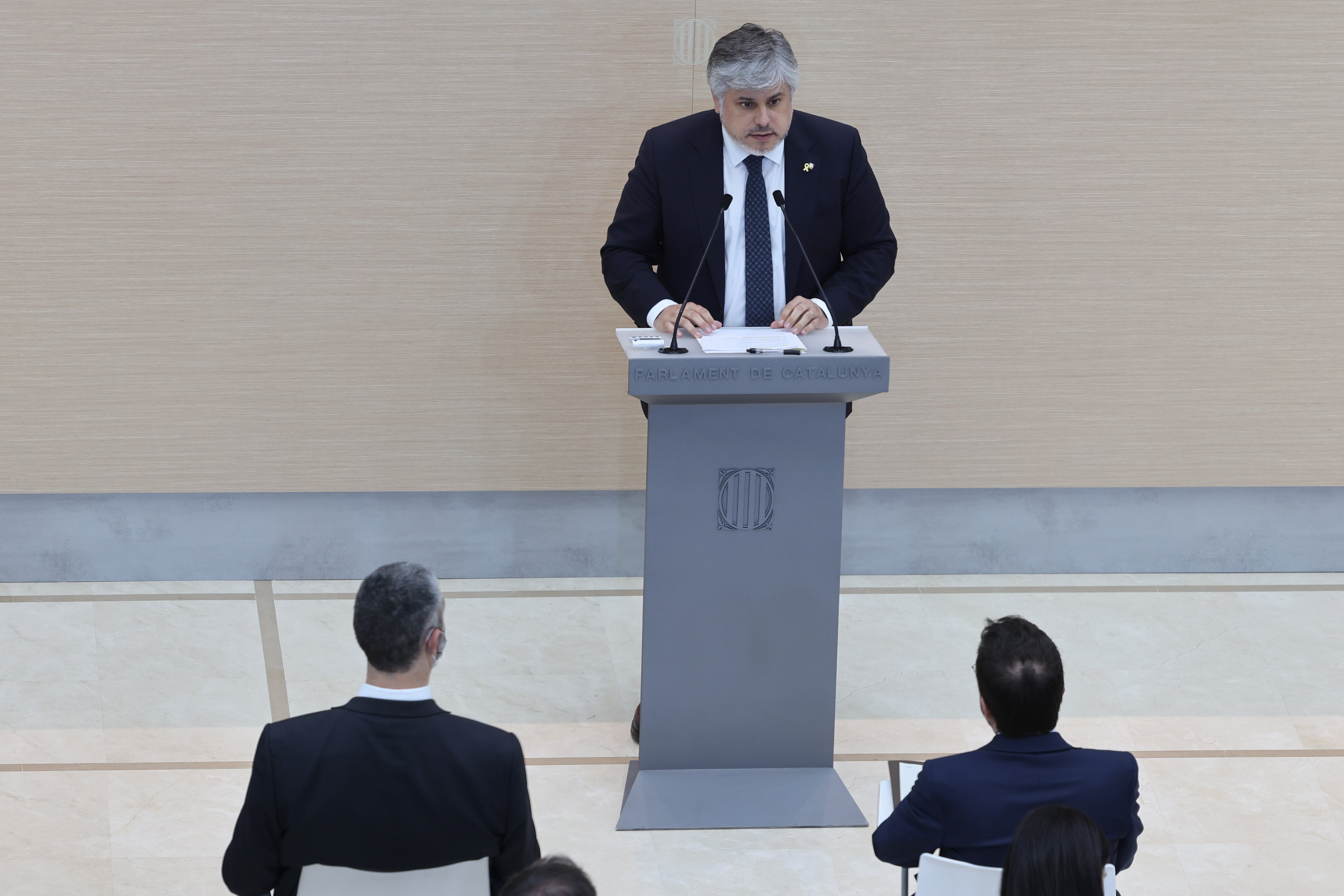The tension between the two principal Catalan pro-independence parties, ERC (Republican Left) and Junts (Together for Catalonia), continued today as the first debate on the investiture as president of the Republican candidate, Pere Aragonès, got underway. The leader of the Junts parliamentary group, Albert Batet, stressed during his speech that it would take days and weeks to reach an agreement, and asked the ERC candidate to forego the second ballot of the plenary session for the investiture, scheduled for this coming Tuesday. Aragonès, however, replied that he would work to reach an agreement before Tuesday's session and advised his pro-independence colleague that it was his obligation, out of respect for the house, to submit himself to the second vote.
The Carles Puigdemont-led Junts party decided in a special meeting of its executive yesterday that it would abstain in today's first ballot, and Batet informed Aragonés of this, in addition to warning him that an agreement between the two parties will be very difficult before Tuesday.
"At Junts we have no doubt and do not question that you must be the 132nd president of the Generalitat of Catalonia. The immense honour of presiding over the Generalitat is what you are entitled to. We will not ask you to step aside. We will ask you to take a step forward," Batet said, following the argument put forward by the general secretary of Junts, Jordi Sànchez, in his conference last Tuesday.
Albert Batet (Junts) asks Pere Aragonès (ERC) to forego Tuesday's second ballot on the presidential investiture.
"Do politics"
However, the leader of the Junts group called on ERC to “do politics” and made it clear that his party was not speculating on new elections.
"After today's vote, with a political commitment to reach a good agreement, which we see as possible in the coming days and weeks, we formally ask [Aragonès] to give up the second investiture vote," said Batet, who recalled that the ERC leader has no obligation to submit to the second ballot and urged him to continue working “side by side”.
Opportunity and responsibility
Batet began his speech by recalling that for the first time pro-independence parties have won more than 52% of votes in a Catalan election, and had the largest parliamentary majority in favour of the Catalan Republic that the house had ever had. "It's an opportunity and a responsibility," he said, adding that it should make it possible to move forward, "not to do the same."
"We don't want an agreement for the investiture of a president, we want an agreement for a legislature. A good agreement, because that 52% must have political consequences. It forces us to agree on a strategy and build a renewed alliance that commits us all," he argued.
At the same time, however, the president of Junts urged ERC not to repeat the mistakes and tensions between the pro-independence forces that were experienced in the previous legislature, citing episodes like the failure to invest Carles Puigdemont as president, the failure to invest Jordi Turull the day before he entered prison, the absence of a single unitary response to the convictions in the Supreme Court independence leaders' trial and the response to the disqualification from office of president Quim Torra. "The question we must humbly ask ourselves is: have we learned from our mistakes, will we have learned the lesson?" Batet asked rhetorically, before concluding: "Without a good accord, we will not resolve these issues."
"Space of bifurcation"
Given all this, he said that it was essential to work from what he described as "the space of bifurcation", in reference to the area of the Catalan leaders in exile, which he describes as "the free space in Europe".
Batet insisted on the willingness of Junts to give a chance to dialogue with the Spanish state, its willingness to sit at the dialogue table - "all parties must yield, we must all make concessions," he admitted - but assured that all the successes achieved in recent years by the independence movement have come from exile, so the exile body Council for the Republic was key, he said, as a space that defeats and avoids Spanish repression, while the Catalan government fights from within the territory to overcome the crisis.
"Now, the pro-independence parties have the responsibility and the obligation to understand each other. People are tired of quarrels," he said, demanding a solid pact, and calling for "discouragement and confusion" to be replaced by "hope". “Junts wants a coalition government, not an agreement of submission or imposition, but rather one of assumption and alliance,” he stressed.
The reply from Aragonès
With regard to the victories achieved in Europe, Aragonès noted the victories achieved by the independence movement in the different elections, and called on Junts to work for a strong and broad government.
"My offer is clear. I offer you a programme, which I set out this morning. There are no insurmountable differences here. I offer you a government that recognizes the weightings of the parliamentary majorities," said Aragonés, in addition to offering improvements in the work mechanisms of the coalition: "Let's agree on the mechanisms, so that we can share the programme and share the composition [of the government]." Aragonés assured that there were no differences that could not be overcome and any differences that existed were smaller than that had emerged in previous negotiations.

